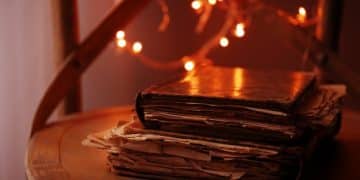Author Spotlight: Stephen King Shares His Favorite Books and Authors

Author Spotlight: Stephen King Shares His Favorite Books and Authors of All Time offers an intimate look into the literary influences that shaped the master of horror, revealing the books and writers that inspired his iconic storytelling.
Delve into the literary world that shaped the master of horror in Author Spotlight: Stephen King Shares His Favorite Books and Authors of All Time. Discover the books and authors that inspired Stephen King’s acclaimed storytelling and unique style, offering a glimpse into the mind of a literary icon.
Stephen King’s Early Literary Influences
Stephen King’s journey to becoming one of the world’s most successful authors was paved with the books and authors that deeply influenced him. From a young age, King devoured literature across various genres, which helped shape his unique storytelling style and thematic approach.
The Impact of Horror Classics
King has often cited classic horror authors as significant influences on his writing. These writers introduced him to the genre’s conventions and possibilities, laying the groundwork for his own contributions.
- H.P. Lovecraft: King admires Lovecraft’s atmospheric prose and cosmic horror themes, which explore humanity’s insignificance in the face of immense, unknowable forces.
- Shirley Jackson: Jackson’s ability to create suspense and psychological horror in ordinary settings deeply impressed King, influencing his own use of everyday environments to build tension.
- Richard Matheson: Matheson’s novels, particularly “I Am Legend,” showed King how to blend horror with science fiction and explore themes of isolation and societal breakdown.
Discovering Fantasy and Science Fiction
Beyond horror, King also drew inspiration from fantasy and science fiction, expanding his creative toolkit and thematic range. These genres offered him new avenues for exploring the human condition.
- J.R.R. Tolkien: Tolkien’s “The Lord of the Rings” demonstrated the power of world-building and epic storytelling, influencing King’s own ambitious narratives.
- Ray Bradbury: Bradbury’s lyrical prose and focus on character development in science fiction stories taught King the importance of emotional resonance in speculative fiction.
- Robert Heinlein: Heinlein’s exploration of social and political themes in his science fiction novels encouraged King to incorporate social commentary into his own work.
King’s early exposure to these literary giants helped shape his understanding of storytelling and genre conventions. These influences are evident in his own works, which blend horror with elements of fantasy, science fiction, and social commentary, making his stories both terrifying and thought-provoking.

Authors Stephen King Recommends
Throughout his career, Stephen King has been vocal about the authors he admires and recommends to aspiring writers and avid readers alike. These recommendations provide insight into the qualities King values in storytelling and the types of narratives that resonate with him.
Modern Masters of Horror
King often highlights contemporary horror authors who continue to push the boundaries of the genre. His recommendations reflect his appreciation for innovative storytelling and unique approaches to horror.
- Peter Straub: King praises Straub’s sophisticated prose and intricate plotting, which elevate horror to a literary level.
- Clive Barker: Barker’s visceral and imaginative horror, which often blends the grotesque with the beautiful, has earned King’s admiration.
- Dan Simmons: Simmons’ ability to combine horror with historical and literary references has made him a favorite of King’s.
Authors of Diverse Genres
King also recommends authors from genres beyond horror, demonstrating his wide-ranging literary tastes and appreciation for excellent storytelling, regardless of genre.
- George Pelecanos: Pelecanos’ gritty crime novels, which explore the dark underbelly of urban life, appeal for their realism and character-driven narratives.
- Dennis Lehane: Lehane’s suspenseful thrillers, often set in Boston, captivate with their complex plots and morally ambiguous characters.
- Tana French: French’s atmospheric mysteries, which focus on psychological depth and intricate character relationships, have earned King’s praise.
King’s recommendations offer a diverse reading list for anyone looking to explore different genres and styles of storytelling. These authors showcase a range of talents and perspectives, reflecting King’s appreciation for literary excellence across various genres.
The Books That Shaped Stephen King’s Writing
Stephen King has frequently discussed the specific books that have had a profound impact on his writing. These books have influenced his themes, style, and approach to storytelling, providing a roadmap for understanding his literary development.
“I Am Legend” by Richard Matheson
Matheson’s “I Am Legend” is a post-apocalyptic horror novel that deeply influenced King. The story’s exploration of isolation, survival, and the breakdown of society resonated with King and inspired his own use of these themes.
“The Haunting of Hill House” by Shirley Jackson
Jackson’s “The Haunting of Hill House” exemplifies psychological horror, creating suspense and dread through atmosphere and character development rather than explicit violence. This novel taught King the power of subtle horror.
“Lord of the Flies” by William Golding
Golding’s “Lord of the Flies,” while not strictly horror, delves into the darker aspects of human nature. Its portrayal of savagery and loss of innocence profoundly impacted King, influencing his exploration of these themes in his work.
These books served as formative texts for Stephen King, shaping his understanding of storytelling and thematic exploration. Their influence is evident in his own novels, which often blend horror with elements of psychological suspense, social commentary, and character-driven narratives.
How These Books Shaped King’s Style
The literary influences on Stephen King are not limited to thematic inspiration but also extend to his stylistic choices. The way he crafts prose and builds tension is a direct result of the authors he admired and studied.
Atmospheric Storytelling
King’s atmospheric storytelling is heavily influenced by H.P. Lovecraft and Shirley Jackson. These authors taught him how to create a sense of dread and unease through descriptive language and psychological depth.
Relatable Characters
King’s ability to create relatable and realistic characters is evident from authors like Robert Heinlein and Ray Bradbury. He learned the importance of character development from reading relatable and thought-provoking masterpieces.
The Combination of Genres
King’s blend of horror with elements of fantasy, science fiction, and social commentary is a testament to his diverse literary influences. Authors like Richard Matheson and J.R.R. Tolkien, allowed for King to see the various aspects of combining literary work.
Stephen King’s literary influences are evident in his writing style, crafting prose and generating tension. Authors such as H.P. Lovecraft, and Ray Bradbury have taught King how to create a sense of dread with psychological depth.
The Enduring Impact on Modern Literature
Stephen King’s influence on modern literature is profound and far-reaching. As one of the world’s most successful and widely read authors, his work has shaped the landscape of contemporary horror, thriller, and suspense genres.
- Popularizing Horror: King played a crucial role in popularizing horror literature, breaking down literary snobbery and making the genre accessible to a wide audience.
- Influencing Contemporary Authors: Many modern authors cite King as a major influence, emulating his storytelling techniques and thematic approaches.
- Shaping Pop Culture: King’s novels have been adapted into numerous films, TV series, and other media, shaping pop culture and influencing how audiences perceive horror and suspense.
King’s impact extends beyond the realm of literature, permeating pop culture and influencing how audiences perceive horror, suspense, and the human condition. His stories resonate with readers and viewers because they tap into universal fears and anxieties, reflecting the complexities of modern life.
Why Reading Influences is Crucial for Writers
Understanding an author’s literary influences can enrich the reading experience and offer aspiring writers valuable insights. By exploring the books and authors that shaped Stephen King’s writing, readers can gain a deeper appreciation for his work and the art of storytelling.
- Understanding Literary Context: Exploring an author’s influences provide context for their work, revealing the literary traditions and movements that shaped their style and themes.
- Identifying Themes and Techniques: Recognizing recurring themes and techniques in an author’s work can enhance the reading experience and provide a greater appreciation for their storytelling abilities.
- Expanding Reading Horizons: Exploring an author’s influences can lead readers to discover new books and authors, expanding their literary horizons and enriching their understanding of the world.
Exploring an author’s influences can lead to an increase in reading horizons, by providing context to several traditions and movements. This can enhance the experience by a greater appreciation for storytelling.
| Key Point | Brief Description |
|---|---|
| 📖 Early Influences | Classic horror like Lovecraft and Jackson shaped King’s dark storytelling. |
| ✍️ Recommended Authors | Peter Straub, Clive Barker, and others showcase King’s taste in horror and beyond. |
| 📚 Key Books | “I Am Legend,” “Haunting of Hill House,” and “Lord of the Flies” were formative works. |
| 🌟 Modern Impact | King’s work revolutionized horror and influenced countless contemporary authors. |
Frequently Asked Questions
▼
King often cites H.P. Lovecraft, Shirley Jackson, and Richard Matheson as major influences, particularly in the realm of horror.
▼
King frequently recommends writers like Peter Straub, Clive Barker, and Dennis Lehane for their unique storytelling approaches.
▼
The themes of isolation, psychological horror, and the darker aspects of human nature is exemplified in the selected books.
▼
King’s atmospheric storytelling, with relateable and realistic characters, are all directly influenced from the selected books.
▼
Understanding an author’s context can provide an author with literary movements, which create distinct writing styles.
Conclusion
Exploring the literary influences of Stephen King offers a unique insight into the creation of his iconic works. From the horror classics that ignited his imagination to the contemporary authors he admires, King’s reading list serves as a testament to the power of literature to shape both writers and readers alike.

![Author Spotlight: Unveiling [Author's Name]'s Writing-Life Balance Author Spotlight: Unveiling [Author's Name]'s Writing-Life Balance - Cover Image](https://noveltiesnew.com/wp-content/uploads/2025/06/noveltiesnew.com_3_1750100051_30a4b85f_cover-360x180.jpg)
![Behind the Scenes with [Author's Name]: Writing Routine & Workspace Behind the Scenes with [Author's Name]: Writing Routine & Workspace - Cover Image](https://noveltiesnew.com/wp-content/uploads/2025/06/noveltiesnew.com_3_1750100055_f946425a_cover-360x180.jpg)

![Author Spotlight: Unlocking [Author's Name]'s Secrets to Writer's Block & Deadline Mastery Author Spotlight: Unlocking [Author's Name]'s Secrets to Writer's Block & Deadline Mastery - Cover Image](https://noveltiesnew.com/wp-content/uploads/2025/06/noveltiesnew.com_3_1750098593_ed54c55c_cover-360x180.jpg)
![Author Spotlight: [Author's Name]'s Top 3 Writing Tips for 2025 Author Spotlight: [Author's Name]'s Top 3 Writing Tips for 2025 - Cover Image](https://noveltiesnew.com/wp-content/uploads/2025/06/noveltiesnew.com_3_1750099356_ebf5848c_cover-360x180.jpg)